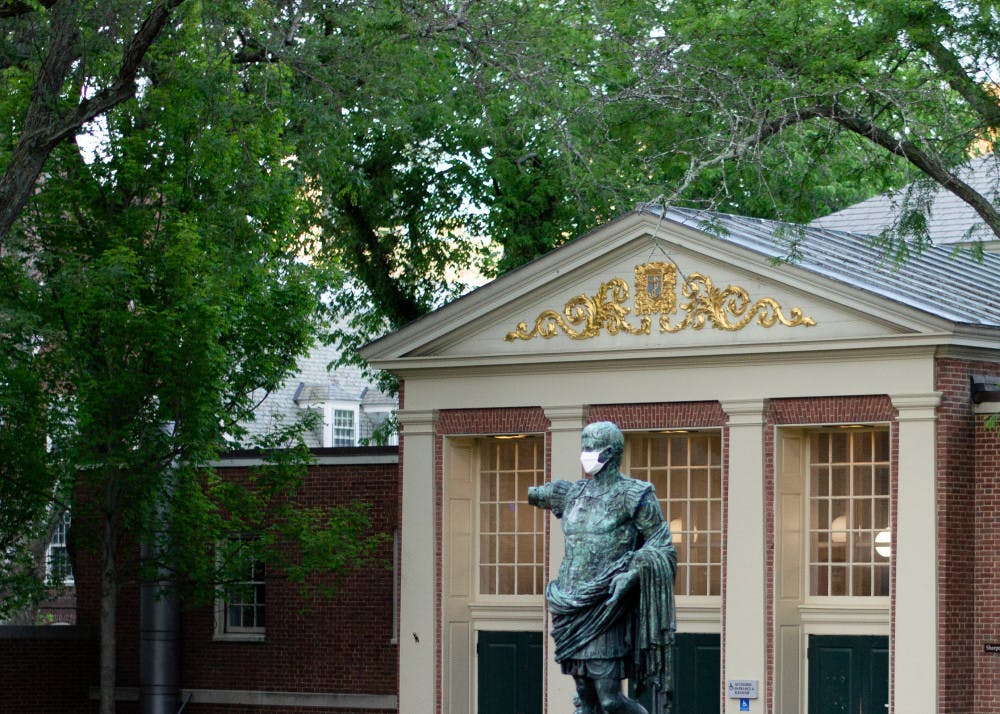For Natalia Brown ’23, the decision to return as an in-person Residential Peer Leader was not an easy one. When the University announced its phased opening plan, she considered pulling out of the RPL program entirely. “It was almost too much stress,” Brown said.
As the return of the University’s undergraduate population nears, she and other RPLs are grappling with how to support their residents and build community amid the health and safety restrictions demanded by the ongoing pandemic.
RPLs have been meeting with University health officials from Counseling and Psychological Services and Health Services to discuss their responsibilities for the fall semester, Brown said.
As part of a campus-wide effort to promote health and safety this semester, RPLs are expected to foster dialogues within their halls to reiterate the importance of observing healthy practices as outlined by the University, Rick Rudnick, associate dean and director of residential education, wrote in an email to The Herald.
“It is essential that every member of the community (adheres) to the established guidelines,” Rudnick wrote. “RPLs will be engaging their residents in conversations about the importance of these guidelines and the accountability we all share to each other as members of the community,” he added.
Students returning to campus must sign a commitment form listing the University’s expectations for student behavior. If a student violates these commitments, which are meant to prevent infection-spreading activities, there could be more expedited and, in some instances, “more severe consequences than in a non-pandemic world,” Executive Vice President for Planning and Policy Russell Carey ’91 told The Herald earlier this month.
With the increased public health risk that comes with parties and social activities this fall, RPL responsibilities have more weight. RPLs are not obliged by the Office of Residential Life to report parties unless they are a serious risk to public health, and RPLs themselves do not hold the power to impose any sort of consequence, Brown said.
While reporting is left to the discretion of RPLs, many view the situation surrounding the pandemic as warranting more critical judgement.
“My response to a party as an RPL would be slightly more serious than pre-COVID since there are public safety risks,” Brown said. “RPLs are not a police force in (residence) halls, so whatever action we do pursue comes from an informed place of empathy and public safety concerns,” she added.
Instances where disciplinary action is needed are likely, but the University is “not approaching this from a punitive point of view,” Carey said. Rather, the University hopes “to promote good and healthy behaviors on campus,” he said, by emphasizing “information sharing so that everyone can be safer.”
Like many of their other responsibilities, which include community building and event programming, these conversations will primarily occur virtually.
“We aren’t going to be responsible necessarily for policing social-distancing policies and things like that,” Evan Mizerak ’22 said.
In his first semester as a RPL in fall 2019, Mizerak lived with first-years in Jameson-Mead Hall. This semester, he will be living in Woolley Hall, another first-year dorm — but without first-years.
The University’s Plan for a Healthy and Safe 2020-21 outlines a public health campaign with a focus on informing the University community on “basics, such as the need for handwashing and wearing masks, and also broader issues such as the importance of undergoing testing as requested, social distancing and assisting with facility cleaning.” As part of this campaign, RPLs will be expected “to deliver remote, virtual programming and unit-based community building prior to (students’) arrival,” according to the plan.
RPLs were offered the opportunity to serve remotely this semester, not living in residence halls and instead focusing on community building online. They could also change their initial plans after the University's phased approach was announced, Brown said. She ultimately decided to continue as an RPL in person when she was told that they would be able to move in early.
Brown hopes that students “are able to keep it together so that those of us who are here don’t have to go home,” she said. “I also hope that we will have adequate resources to talk about any anxiety (or) mental health issues,” she added, “especially if we don’t go back to in-person classes.”
As an RPL, Mizerak hopes his residents will be safe and find normalcy in a time of unprecedented change. “For me, the biggest hope is just that everybody stays healthy and has as normal a semester academically as is possible,” he said.

Jack Walker served as senior editor of multimedia, social media and post- magazine for The Herald’s 132nd Editorial Board. Jack is an archaeology and literary arts concentrator from Thurmont, Maryland who previously covered the Grad School and staff and student labor beats.





